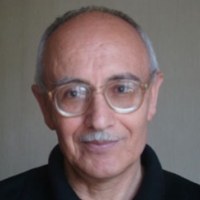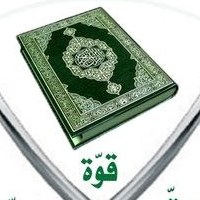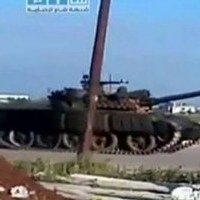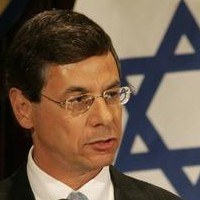![]()
The Damascus Declaration was a statement of unity by Syrian opposition figures issued October 16, 2005 criticizing the Syrian “authorities’ monopoly of everything for more than 30 years” and “establishing an authoritarian, totalitarian, and cliquish regime.” The Declaration called for “mobilizing all the energies of Syria, the homeland and the people, in a rescue task of … changing Syrian policies at home and abroad” to reform the country “peaceful, [and] gradual, founded on accord, and based on dialogue and recognition of the other.”
The original five-paged document unveiled at an unauthorized press conference was signed by more than 250 “major opposition figures” as well as parties “both secular and religious, Arab and Kurdish.” The Declaration was launched by Syrian journalist and activist Michel Kilo. The first draft was written by Syrian writer and thinker Abdulrazak Eid who also drafted “The Statement of 1000” [Jan 9, 2001]. Another democracy activist, Riyad Sayf, was the first signatory. Read below the founding document of the Damascus Declaration for Democratic National Change as drafted on October 16, 2005:
The Damascus Declaration for Democratic National Change
Syria today is being subjected to pressure it had not experienced before, as a result of the policies pursued by the regime, policies that have brought the country to a situation that calls for concern for its national safety and the fate of its people. Today Syria stands at a crossroad and needs to engage in self-appraisal and benefit from its historical experience more than any time in the past.
The authorities’ monopoly of everything for more than 30 years has established an authoritarian, totalitarian, and cliquish [fi’awi] regime that has led to a lack of [interest in] politics in society, with people losing interest in public affairs. That has brought upon the country such destruction as that represented by the rending of the national social fabric of the Syrian people, an economic collapse that poses a threat to the country, and exacerbating crises of every kind, in addition to the stifling isolation which the regime has brought upon the country as a result of its destructive, adventurous, and short-sighted policies on the Arab and regional levels, and especially in Lebanon. Those policies were founded on discretionary bases and were not guided by the higher national interests.
All that — and many other matters — calls for mobilizing all the energies of Syria, the homeland and the people, in a rescue task of change that lifts the country out of the mold of the security state and takes it to the mold of the political state, so that it will be able to enhance its independence and unity, and so that its people will be able to hold the reins of their country and participate freely in running its affairs. The transformations needed affect the various aspects of life, and include the State, the authorities, and society, and lead to changing Syrian policies at home and abroad.
In view of the signatories’ feeling that the present moment calls for a courageous and responsible national stand, that takes the country out of its condition of weakness and waiting that is poisoning the present political life, and spares it the dangers that loom in the horizon, and in view of their belief that a clear and cohesive line on which society’s various forces agree, a line that projects the goals of democratic change at this stage, acquires special importance in the achievement of such change by the Syrian people and in accordance with their will and interests, and helps to avoid opportunism and extremism in public action, they have reached an accord on the following bases:
Establishment of a democratic national regime is the basic approach to the plan for change and political reform. It must be peaceful, gradual, founded on accord, and based on dialogue and recognition of the other.
Shunning totalitarian thought and severing all plans for exclusion, custodianship, and extirpation under any pretext, be it historical or realistic; shunning violence in exercising political action; and seeking to prevent and avoid violence in any form and by any side.
Islam — which is the religion and ideology of the majority, with its lofty intentions, higher values, and tolerant canon law — is the more prominent cultural component in the life of the nation and the people. Our Arab civilization has been formed within the framework of its ideas, values, and ethics and in interaction with the other national historic cultures in our society, through moderation, tolerance, and mutual interaction, free of fanaticism, violence, and exclusion, while having great concern for the respect of the beliefs, culture, and special characteristics of others, whatever their religious, confessional, and intellectual affiliations, and openness to new and contemporary cultures.
No party or trend has the right to claim an exceptional role. No one has the right to shun the other, persecute him, and usurp his right to existence, free expression, and participation in the homeland.
Adoption of democracy as a modern system that has universal values and bases, based on the principles of liberty, sovereignty of the people, a State of institutions, and the transfer of power through free and periodic elections that enable the people to hold those in power accountable and change them.
Build a modern State, whose political system is based on a new social contract, which leads to a modern democratic Constitution that makes citizenship the criterion of affiliation, and adopts pluralism, the peaceful transfer of power, and the rule of law in a State all of whose citizens enjoy the same rights and have the same duties, regardless of race, religion, ethnicity, sect, or clan, and prevents the return of tyranny in new forms.
Turn to all the components of the Syrian people, all their intellectual trends and social classes, political parties, and cultural, economic, and social activities, and give them the opportunity to express their views, interests, and aspirations, and enable them to participate freely in the process of change.
Guarantee the freedom of individuals, groups, and national minorities to express themselves, and safeguard their role and cultural and linguistic rights, with the State respecting and caring for those rights, within the framework of the Constitution and under the law.
Find a just democratic solution to the Kurdish issue in Syria, in a manner that guarantees the complete equality of Syrian Kurdish citizens with the other citizens, with regard to nationality rights, culture, learning the national language, and the other constitutional, political, social, and legal rights on the basis of the unity of the Syrian land and people. Nationality and citizenship rights must be restored to those who have been deprived of them, and the file must be completely settled.
Commitment to the safety, security, and unity of the Syrian national [? union] and addressing its problems through dialogue, and safeguard the unity of the homeland and the people in all circumstances, commitment to the liberation of the occupied territories and regaining the Golan Heights for the homeland, and enabling Syria to carry out an effective and positive Arab and regional role.
Abolish all forms of exclusion in public life, by suspending the emergency law; and abolish martial law and extraordinary courts, and all relevant laws, including Law 49 for the year 1980; release all political prisoners; [allow] the safe and honorable return of all those wanted and those who have been voluntarily or involuntarily exiled with legal guarantees; and ending all forms of political persecution, by settling grievances and turning a new leaf in the history of the country.
Strengthen the national army and maintain its professional spirit, and keep it outside the framework of political conflict and the democratic game, and confine its task to protecting the country’s independence, safeguarding the constitutional system, and defending the homeland and the people.
Liberate popular organizations, federations, trade unions, and chambers of commerce, industry, and agriculture from the custodianship of the State and from party and security hegemony. Provide them with the conditions of free action as civil society organizations.
Launch public freedoms, organize political life through a modern party law, and organize the media and elections in accordance with modern laws that ensure liberty, justice, and equal opportunities for everyone.
Guarantee the right of political work to all components of the Syrian people in their various religious, national, and social affiliations.
Emphasize Syria’s affiliation to the Arab Order, establish the widest relations of cooperation with the Arab Order, and strengthen strategic, political, and economic ties that lead the [Arab] nation to the path of unity. Correct the relationship with Lebanon, so that it will be based on liberty, equality, sovereignty, and the common interests of the two peoples and countries.
Observe all international treaties and conventions and the Universal Declaration on Human Rights, and seek within the framework of the United Nations and in cooperation with the international community to build a more just World Order, based on the principles of peace and mutual interest, warding off aggression, and the right of nations to resist occupation, and to oppose all forms of terrorism and violence directed against civilians.
The signatories to this declaration believe the process of change has begun, in view of its being a necessity that brooks no postponement because the country needs it. It is not directed against anyone, but requires everyone’s efforts. Here we call on the Ba’thist citizens of our homeland and citizens from various political, cultural, religious, and confessional groups to participate with us and not to hesitate or be apprehensive, because the desired change is in everyone’s interest and is feared only by those involved in crimes and corruption. The process of change can be organized as follows:
1. Opening the channels for a comprehensive and equitable national dialogue among all the components and social, political, and economic groups of the Syrian people in all areas and on the following premises:
The need for radical change in the country, and the rejection of all forms of cosmetic, partial, or circumspection reform.
Seek to stop the deterioration and the potential collapse and anarchy which could be brought upon the country by a mentality of fanaticism, revenge, extremism, and objection to democratic change.
Rejection of the change that is brought from abroad, while we are fully aware of the fact and the objectivity of the link between the internal and the external in the various political developments that are taking place in our contemporary world, without pushing the country toward isolation, adventure, and irresponsible stands, and anxiousness to safeguard the country’s independence and territorial integrity.
2. Encourage initiatives for the return of society to politics, restore to the people their interest in public affairs, and activate civil society.
3. Form various committees, salons, forums, and bodies locally and throughout the country to organize the general cultural, social, political, and economic activity and to help it in playing an important role in advancing the national consciousness, giving vent to frustrations, and uniting the people behind the goals of change.
4. A comprehensive national accord on a common and independent program of the opposition forces, which charts the steps of the stage of transformation and the features of the democratic Syria of the future.
5. Pave the way for convening a national conference in which all the forces that aspire to change may participate, including those who accept that from among the regime, to establish a democratic national regime based on the accords mentioned in this declaration, and on the basis of a broad and democratic national coalition.
6. Call for the election of a Constituent Assembly that draws up a new Constitution for the country that foils adventurers and extremists, and that guarantees the separation of powers, safeguards the independence of the judiciary, and achieves national integration by consolidating the principle of citizenship.
7. Hold free and honest parliamentary elections that produce a fully legitimate national regime that governs the country in accordance with the Constitution and the laws that are in force, and on the basis of the view of the political majority and its program.
These are broad steps for the plan for democratic change, as we see it, which Syria needs, and to which its people aspire. It is open to the participation of all the national forces: political parties, civilian and civil bodies, and political, cultural, and professional figures. The plan accepts their commitments and contribution, and is open to review through the increase in the collectivity of political work and its effective societal forces.
We pledge to work to end the stage of despotism. We declare our readiness to offer the necessary sacrifices for that purpose, and to do all what is necessary to enable the process of democratic change to take off, and to build a modern Syria, a free homeland for all of its citizens, safeguard the freedom of its people, and protect national independence.
Damascus, 16 October 2005.
Signatories to the Declaration
Parties and Organizations:
Democratic National Grouping in Syria
Kurdish Democratic Alliance in Syria
Committees for the Revival of Civil Society
Kurdish Democratic Front in Syria
Future Party (Shaykh Nawwaf al-Bashir)
The Muslim Brotherhood group of Syria, [Wikipedia]
National Figures:
Riyad Sayf
Jawdat Sa’id
Dr Abd-al-Razzaq Id
Samir al-Nashar
Dr Fida Akram al-Hurani
Dr Adil Zakkar
Abd-al-Karim al-Dahhak
Haytham al-Malih
Nayif Qaysiyah
View or download this article as PDF.
English text source: faculty-staff.ou.edu by Joshua Landis. He blogs at Syria Comment.



 RSS
RSS











Latest Comments
Hello Mike, Thank you for your positive feedback to the article. I felt there wasn’t too much critical analysis of ...
Thanks for this considered and well constructed article. A follow up article on the manner in which the editorial contro...
THE CLUELESSNESS OF CLAIMING THAT OBAMA'S MIDDLE EAST POLICIES WERE A FAILURE CANNOT BE FURTHER FROM THE TRUTH, WHAT THE...
As long as Obama is the president of the usa do not trust the us government......
Thank you for an good read....